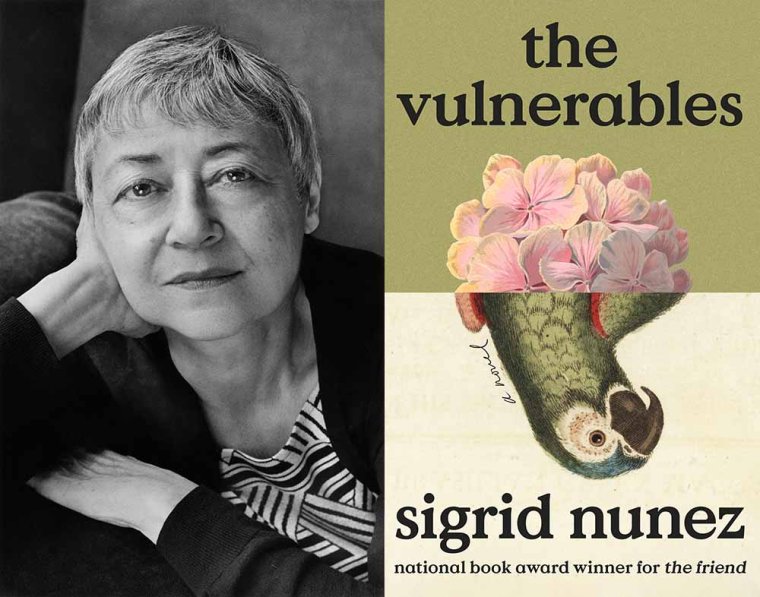This week’s installment of Ten Questions features Sigrid Nunez, whose new novel, The Vulnerables, is out today from Riverhead Books. In this delightfully meandering narrative that reads like a long letter from a brilliant and gossipy friend, Nunez explores the surreal experience of living through the early days of the pandemic in New York City. The narrator, an author, moves into the apartment of another writer whose parrot needs care while that writer is stuck with her in-laws in California. Meanwhile the narrator offers her own apartment to a different acquaintance in need of a place to stay. Fond of macaws, the narrator is thrilled to care for the bird in the author’s swanky home—until she finds she must share the space with a surprise, human tenant. Like Nunez’s two most recent novels, The Friend (2018) and What Are You Going Through (2020), both also published by Riverhead, The Vulnerables is less about what happens than what the narrator thinks about it, the many memories and ideas sparked in the mind as it confronts the unpredictable events and personalities that chance throws in its field of perception. Some of the most engaging parts of the book are the narrator’s recollections of bygone experiences; seemingly disconnected from the pandemic “plot,” these reveries become moving—and often amusing—meditations on childhood, friendship, romantic love, and human vulnerability in a chaotic and violent world: “I want to know why I feel as though I have been mourning all my life,” says the narrator. A particular treat for the writer-reader, the novel is full of literary allusions—from Charles Baudelaire to Sylvia Plath to Colm Tóibín—and musings on the writing life. Kirkus praises The Vulnerables: “Sharp—and surprisingly tender.” Sigrid Nunez has published nine novels and Sempre Susan: A Memoir of Susan Sontag (Atlas, 2011). A winner of the National Book Award for The Friend and many other honors, she teaches at Hunter College in New York City.

Sigrid Nunez, author of The Vulnerables. (Credit: Marion Ettlinger Higher)
1. How long did it take you to write The Vulnerables?
About two and a half years.
2. What was the most challenging thing about writing the book?
With writing any book, the challenge is always the same: how to find the right words in the right order to express what I mean to say as precisely and artfully as possible. But in this case there was another challenge: how to write a novel in a world that has come to be defined by continuous disaster.
3. Where, when, and how often do you write?
I usually write at home. I try to write every day, preferably in the morning. But when that’s not possible, I try to write at whatever time of day I can.
4. What are you reading right now?
The Pole, the new novel by J. M. Coetzee.
5. Which author or authors have been influential for you, in your writing of this book in particular or as a writer in general?
That would be an endless list. Like most writers I read a lot, and I read like a writer. This means that, in one way or another, just about anything I read is likely to influence whatever I might be working on. If I’m reading something very good, I can expect to find at least one thing that the writer has done well that I’ll be able to put to my own use.
6. Would you recommend writers pursue an MFA?
That depends on the writer. If someone wants not only to write but to teach writing, an MFA is important, given that many schools won’t even consider a job applicant who does not have an MFA.
7. What is one thing that your agent or editor told you during the process of publishing this book that stuck with you?
My agent, who was the first person to read the manuscript, assured me that, despite the book’s often dark, sad subject matter, most readers would find it funny and hopeful. Which is turning out to be true.
8. What is one thing that surprised you during the writing of The Vulnerables?
Possibly that it wasn’t all as hard to write as I had feared it would be.
9. What forms of work, other than writing, did you have to do to complete this book?
One of the novel’s minor characters is a mini macaw named Eureka. I didn’t know a lot about that breed, or about parrots in general, so I had to do some research.
10. What’s the best piece of writing advice you’ve ever received?
Never assume the reader is not as intelligent as you are. That will stop you from being too explicit, and it will spare your reader the irritation of being told what they already know or what they can imagine or deduce for themselves.







